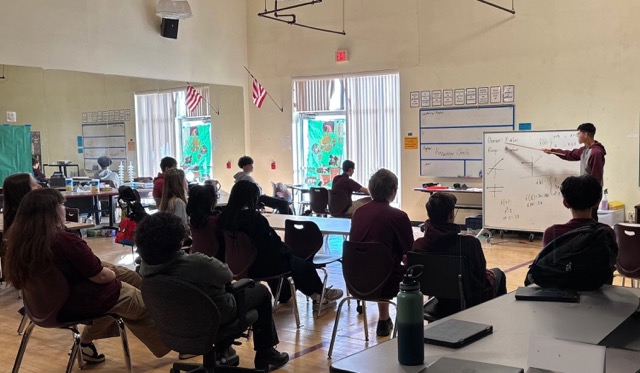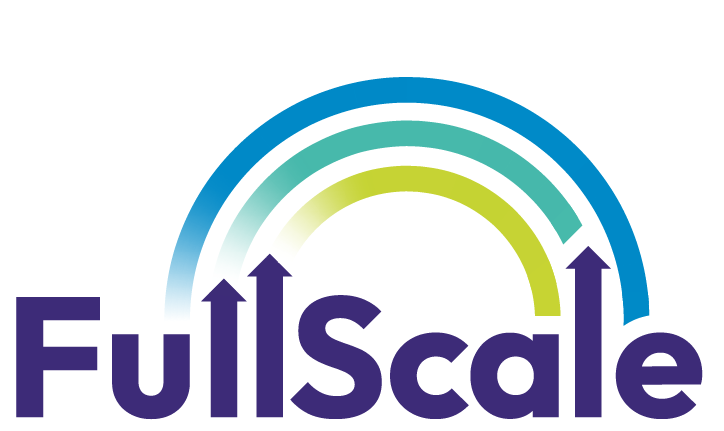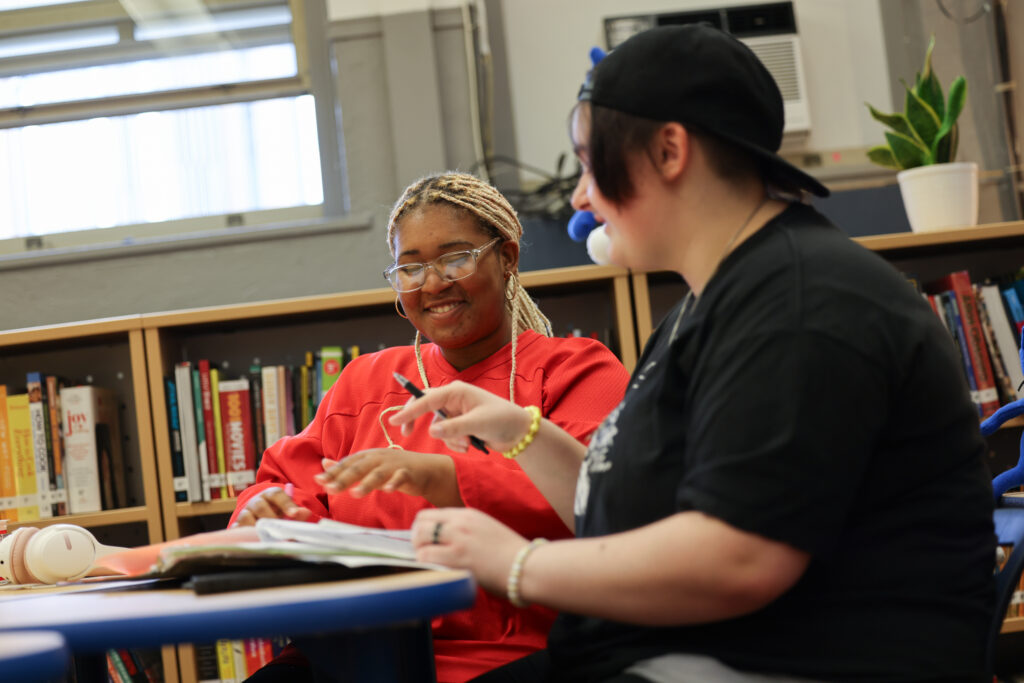In 2024, FullScale (at the time known as The Learning Accelerator) launched the Exponential Learning Initiative (ELI), a bold, national approach to reimagine how we can accelerate learning at the heart of the student experience, to expand the use of effective tech-enabled learning strategies, build evidence around virtual and hybrid models, and create the conditions needed to scale them for equitable student outcomes.
In the spring of 2025, FullScale convened leaders from across the initiative to engage in collaborative problem-solving and surface insights relevant to advancing learning in the field. During the convening, participants were joined by David Delikat, a fourth-year math teacher at Arizona State University Preparatory Academy (ASU Prep). David served as an implementation champion (an educator who leads the way in adopting and supporting new practices) this year for ASU Prep’s ELI-supported initiative, “Archie,” an AI-powered Algebra I tutor for students. He shared with participants his insights on how to empower teacher leaders and build grassroots support for new approaches at the classroom level.
FullScale’s Megan Benay continued the conversation through an interview with David to dig further into his experience as a classroom implementation champion, and what he had to say to the broader education field.
Create the Conditions: What Champions Need to Succeed
Implementation champions don’t just emerge—they grow in the right conditions. Training that helps teachers understand how to implement, and leadership that nudges and reinforces, go a long way. When edtech providers and school leaders invest in these structures, especially in early rollout, they increase the chances that champions not only adopt new tools but help refine and sustain them.
Megan: How would you define an implementation champion, and what does it mean to you?
David: An implementation champion for me is just finding the best way to utilize a tool. Most of the programs that we are given as teachers have a purpose. They are going to have a usage that can benefit students. People don’t make things just to be useless. Then as an implementation champion, it’s a matter of finding a way to have that benefit your students and for them to get meaning and purpose out of it.
Megan: Are there any supports such as training, time, incentives, etc. that you think are critical for sustaining implementation champions in schools?
David: Definitely training, in terms of understanding what their role is as an implementation champion, how to deliver the product to the student, and what strategies to use in the classroom. The biggest one would be developing the mindset of their role as early adopter and helping them understand the goals of implementation in service of improving student learning.
Megan: Do you think that a stipend or some other kind of incentive is a major factor in becoming an implementation champion?
David: I think a stipend is a good carrot to dangle in front of teachers, but I don’t think it’s going to be the ultimate motivating factor in having a teacher take that extra step or get them to become an implementation champion. It will get them to implement it, but I don’t know if it gets into that champion component.
Megan: Do you think it matters for implementation if school leadership, like principals or instructional coaches, are involved?
David: I do think for some teachers, having the principals and coaches involved could be a motivating factor. It doesn’t need to be that they’re overseeing it, or even micromanaging it, but just reminding them of the tools. They can offer it as a solution or just nudge the teacher in the right direction. I definitely don’t think involvement from principals or coaches could hurt.
Megan: Does feeling like you have a voice in the development process influence the likelihood of someone being an implementation champion and continuing to use a tool?
David: Yes, I think having a voice and having that consistent line of communication and being able to give feedback is definitely helpful because it allows the implementer to really feel like they are part of the process and shaping how it is being used in their classroom as well.
David’s perspective highlights that implementation champions are not just early adopters—they are reflective practitioners who actively seek to adapt tools so students derive meaningful benefit. For champions to emerge and thrive, clear roles, quality training, and leadership that supports—not micromanages—are essential. Financial incentives like stipends may encourage initial participation, but lasting commitment comes from intrinsic motivation and a mindset aligned with improving student learning.
Implementation Starts with Fit: Finding the Right People and Places to Partner
Identifying the right fit is crucial for successful edtech implementation. Champions thrive in schools where innovation is encouraged, relationships are strong, and the expectations of early adoption are clearly communicated.
Megan: What do you perceive to be the main barriers for other teachers when it comes to implementing new technology?
David: I would pinpoint two things. The first is the traditionalism of teachers and wanting to do what they know works, and continuing the same processes and using the same materials that they’ve been implementing in prior years. The second thing is mindset. For me, my mindset is how can this be used to benefit my students? How can my students utilize this tool to enhance their learning? But for others who approach teaching in a more traditional way, their mindset is more that they already know method A works, and it’s going to work for these students, so they’re just going to use method A. But they aren’t asking themselves what about method B? Method B could also work for those students, and it could maybe help more or even be better.
Megan: What do you do when a new tool doesn’t go as planned? And how do you course correct if you decide to course correct?
David: Something that’s been instilled in me from my educational background is that it’s a matter of knowing where you’re at with a tool or a new technology. As early adopters, there are going to be some tweaks that need to be made with the product. Not everything is going to go as planned. I think it’s just a matter of not only the teacher understanding that, but the students as well. We have to ask ourselves, what can we gain from it? What can the program gain from us, from our feedback? How can we help to change it or help to make it better for ourselves? It’s a cyclical process, and we are part of it.
Megan: You’ve pinpointed something critical for district leaders and edtech providers: successful early adopters have a growth mindset. New tools rarely work perfectly out of the gate, so it’s essential to partner with educators who see value in iteration. Those with a fixed mindset aren’t the right fit for early implementation.
David: Yes, and also everyone needs to understand their role as an early adopter. Right from the start it needs to be explained that the tool is new, it’s not going to run perfectly the first time, but their role is to figure out what is going to make it run perfectly within a certain time frame.
David’s experience shows that even the best tools stall without alignment between mindset, mission, and support. Champions see themselves as collaborators—ready to experiment, give feedback, and adapt. For edtech providers and system leaders, success starts by partnering with the right educators and environments where innovation can take root.
Bonus Insight: Student Experience Drives Implementation
What ultimately determines whether a product or program gets adopted, sustained, or abandoned is the student experience. Even when tools designed for teachers, e.g., lesson planning, there still must be evidence of improved learning opportunities. As David stated, “The program isn’t the end goal. It’s about how the program and the materials can benefit the learning process in the classroom.” Implementation champions are constantly asking: Does this help my students learn better or improve their experience? For anyone trying to cultivate or support implementation champions, the takeaway is clear: keep students at the center. Gather feedback, observe what’s resonating, and elevate student insight – not just teacher experience – as a critical success metric. Champions are motivated when they see students thriving.






